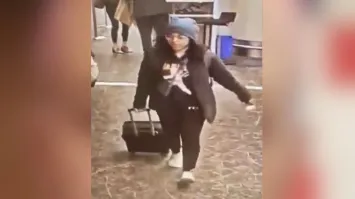The Trump administration has intensified its visa enforcement policies, leading to heightened concerns among international students and scholars in the United States. One of the most notable recent cases is the detention of Badar Khan Suri, an Indian national and postdoctoral researcher at Georgetown University. Allegations of ties to Hamas and the dissemination of antisemitic material have led to his visa revocation and detention, sparking debates over national security, academic freedom, and immigration enforcement.
This incident is part of a broader push by U.S. authorities to scrutinise visa holders more rigorously, particularly those linked to politically sensitive issues. It underscores the evolving challenges faced by international students in the U.S., as immigration policies continue to shift.
Detention of Badar Khan Suri
Badar Khan Suri, an Indian scholar associated with Georgetown University’s Alwaleed Bin Talal Center for Muslim-Christian Understanding, was detained outside his residence in Virginia on March 19, 2025. The Department of Homeland Security (DHS) alleges that Suri maintained connections with a Hamas advisor and engaged in spreading antisemitic narratives through social media.
Key details of his detention include:
- Visa Revocation: Suri’s visa was revoked before his arrest, citing national security concerns.
- Legal Status: He is currently held at a detention facility in Louisiana, awaiting an immigration court hearing.
- University Response: Georgetown University has stated that it was unaware of any illegal activities involving Suri and has affirmed its commitment to due process.
- Legal Defence: Suri’s legal representatives claim that his detention is politically motivated, pointing to his marriage to a U.S. citizen of Palestinian descent as a potential influencing factor.
This development has drawn attention from civil rights groups, raising questions about the transparency of the criteria used to detain international students on national security grounds.
The Trump Administration’s Intensified Visa Crackdown
The detention of Suri is one of several cases reflecting the administration’s increasingly strict stance on visa regulations. Since early 2025, the U.S. government has taken a more aggressive approach to vetting and monitoring visa holders, particularly students and academics from regions linked to geopolitical conflicts.
Key Aspects of the Visa Crackdown
- Expanded Security Vetting: Increased scrutiny of visa applicants, particularly those from nations associated with security concerns.
- Policy Changes: Consideration of new restrictions on citizens from multiple countries, limiting their ability to study or work in the U.S.
- Targeted Deportations: Enhanced enforcement against individuals deemed a national security risk, even without formal criminal charges.
- Academic Restrictions: Increased monitoring of students engaging in political activism or research linked to contentious global issues.
These measures are in line with the administration’s broader objective of tightening immigration control and prioritising national security.
Impact on International Students and Scholars
The increased scrutiny on visa holders has sparked uncertainty among international students in the U.S. Universities and advocacy groups have expressed concerns about the potential effects on academic freedom, research collaborations, and student mobility.
Concerns Raised by Universities and Advocacy Groups
- Chilling Effect on Academic Speech: Students may hesitate to engage in research or discussions on politically sensitive topics.
- Increased Visa Uncertainty: International students may face unexpected visa revocations, affecting their studies and future plans.
- Legal Challenges: Many students lack the resources to challenge deportation or visa cancellations effectively.
- Diminished Global Appeal: The U.S. could see a decline in international student enrolment due to policy unpredictability.
This shift comes at a time when U.S. universities are already competing with other countries, such as Canada and the UK, to attract global talent.
Legal Framework and Precedents
Under U.S. immigration law, the government has the authority to deport individuals deemed a national security risk, even without formal criminal charges. The Trump administration has invoked these provisions to justify deportations under national security grounds, relying on broad interpretations of the law.
Legal Considerations:
- Immigration and Nationality Act (INA) Provisions: Allow for deportation based on perceived security threats.
- Administrative Discretion: Authorities have wide latitude in determining whether a visa holder poses a risk.
- Judicial Oversight: Some recent deportations have faced legal challenges, though outcomes vary.
These factors make it difficult for affected individuals to mount successful legal defences, as proceedings often involve classified evidence that is not fully disclosed to the accused.

Similar Cases and Precedents
Suri’s case is not the only instance of an international student facing scrutiny under the Trump administration’s visa policies. Other notable cases include:
- Ranjani Srinivasan (India): A Columbia University student who voluntarily left the U.S. after her visa was revoked under similar circumstances.
- Mahmoud Khalil (Palestine): A graduate student detained for alleged pro-Palestinian activism.
- Multiple Iranian Scholars: Over the past year, several Iranian researchers have faced visa cancellations over security concerns.
These incidents suggest a broader pattern of intensified visa enforcement that disproportionately affects students from specific backgrounds.
Response from Civil Rights Organisations
Civil rights groups have criticised the administration’s approach, arguing that it may undermine fundamental freedoms. Organisations advocating for international students and scholars have raised the following concerns:
- Lack of Transparency: Authorities often do not disclose the full basis for visa cancellations.
- Potential Political Targeting: Some cases appear linked to individuals’ political views rather than concrete security threats.
- Impact on U.S. Universities: The restrictive environment may discourage top talent from pursuing education in the U.S.
Legal experts warn that such measures could create long-term reputational damage for the U.S. as a leading destination for higher education.
Steps International Students Can Take
In light of these developments, legal experts and university officials recommend that international students take precautionary measures to safeguard their legal status.
Practical Advice for International Students
- Stay Informed: Regularly check for updates on visa policies and changes in enforcement practices.
- Maintain a Clean Legal Record: Avoid activities that could be misconstrued as violating visa terms.
- Seek Legal Guidance: Consult immigration lawyers for advice on rights and options in case of visa issues.
- Engage Cautiously in Political Activities: Be aware of potential implications when participating in activism or protests.
- Utilise University Resources: Many institutions offer legal and immigration support for affected students.
These steps can help mitigate risks and ensure compliance with evolving immigration regulations.
A Changing Landscape for International Scholars
The Trump administration’s visa policies have introduced a new level of uncertainty for international students in the U.S. The detention of Badar Khan Suri exemplifies the heightened scrutiny that many scholars now face, raising questions about the balance between national security and academic freedom.
As immigration enforcement intensifies, students and universities must navigate an evolving landscape with caution. Legal challenges and advocacy efforts continue, but for many international students, the prospect of studying in the U.S. now comes with greater unpredictability. In the coming months, the outcomes of key cases like Suri’s will be closely watched as indicators of future immigration trends.











